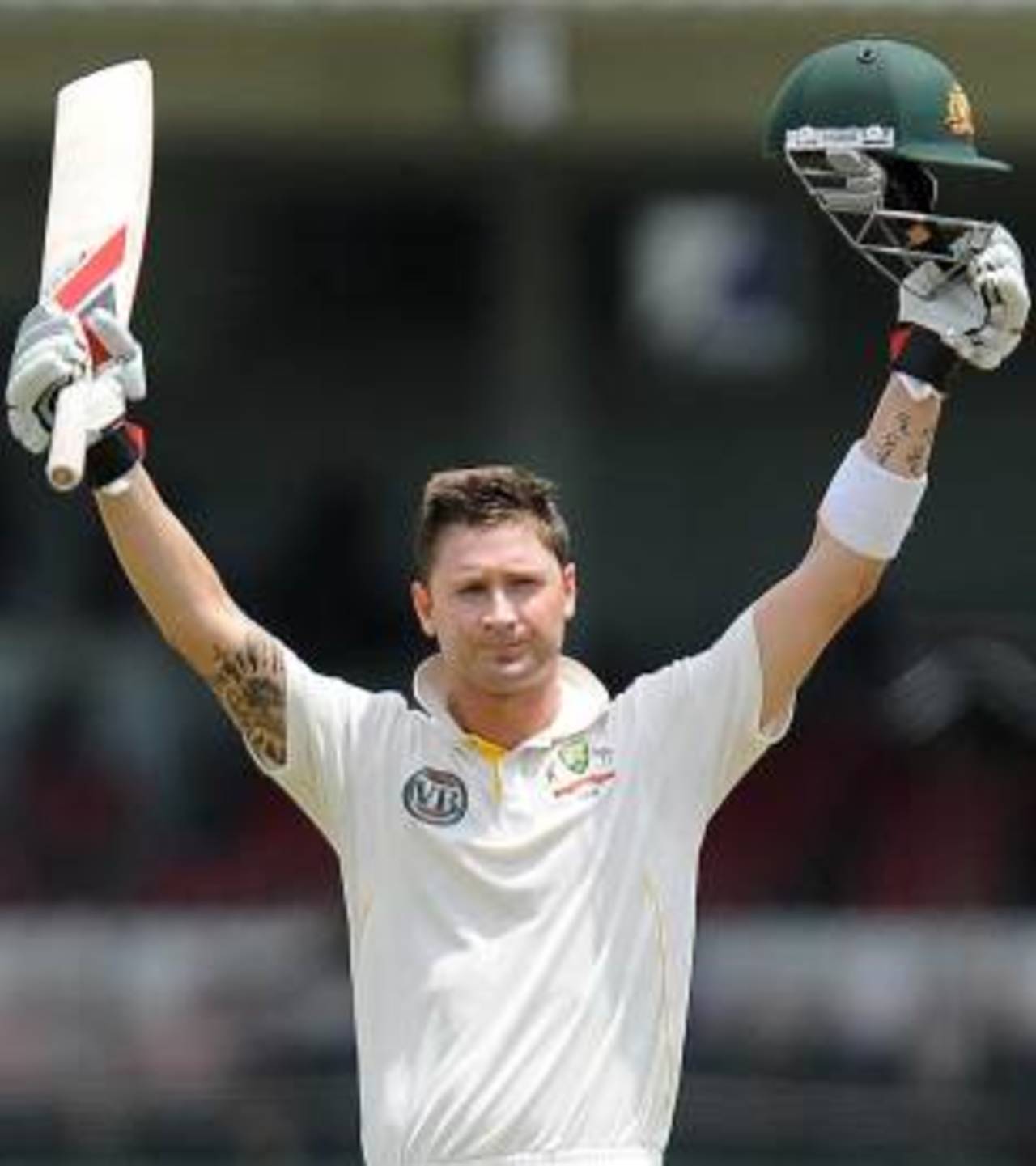Australia waited a long time for an innings like this. Not since January 2010 had the Test captain put his stamp on a match with a century, a double by Ricky Ponting against Pakistan
in Hobart. Not since October 2004, his 151 on debut against India
in Bangalore, had
Michael Clarke made a hundred quite so important to the outcome of a series.
There were mitigating factors. The pitch was too amiable for a fifth day deck, with the exception of a handful of deliveries that spat out of the rough. The bowling was nowhere near the standard of some of the attacks Clarke has had to face, not least the parsimonious Englishmen who so dismantled his game outside off stump during the Ashes last summer. The display was not chance-less, as Prasanna Jayawardene twice spilled opportunities to complete stumpings from the crafty, later rewarded bowling of Rangana Herath. And the match faded to a bore draw, unedifying in its anti-climax.
But these environmental and technical concerns paled next to the mental and the social. Clarke had to show he could bat for his team, to save a match and preserve a series lead. Well as Clarke has led in this series, including an admirably bold 60 in the second innings in Galle, his overall batting record is that of a talented individual more so than a deeply committed team man. Seven years ago in Bangalore Clarke had hinted at greatness, but most of his efforts since have fallen short of that promise. Until today he had perhaps not made another century of similar resonance.
By Clarke's own reckoning, his three best innings before this Test stood out for reasons of personal circumstances. A century in the West Indies in 2008 after he had returned home to grieve with his former girlfriend after she lost her father, and 168 in Wellington last year after he had made another dash home to end that same relationship. Then there was 136 against England in the second Test of 2009 at Lord's, when he struck the ball with rare crispness in a comfortably lost cause.
None of those efforts carried the same burden of team performance that Clarke felt when he walked out to join Phillip Hughes on the fourth afternoon at the fall of Ponting's wicket. At the time the visitors led by only 31 with three wickets down, and the match could still slip into Sri Lankan hands without batting of due care and attention. Indeed, Australia had lately made a habit of surrendering at the wrong times in Test series, allowing opponents such as England, India and even Pakistan to capitalise on wandering minds and leaden feet. Clarke knew all this as he started his innings, playing carefully at first to reach stumps. Having done so, he then spoke frankly of the need to stand up with the bat on day five.
Hughes departed soon after resumption, ominously to the first over of spin. These circumstances had becalmed and disheartened Australian teams before, and decisive action was required. Clarke, having played himself back in, provided it in the most commanding fashion imaginable. His first 24 runs occupied 80 balls - his next 76 a mere 59. Time and again Clarke advanced to drive against the spin of Herath, spicing things up by cutting anything pitched fractionally short. At each stroke Sri Lankan heads sank lower, their hopes of a shared series receding markedly with each Clarke dance down the pitch. He went to his century with another lofted drive over mid-on, and delivered a joyous upper cut in the direction of Australia's dressing room. It was a breathtaking way to secure a series.
To lose this match, after Angelo Mathews' unseemly dawdle to a first-innings century, would have been an injustice for a team that had fought so hard and so intelligently across three Tests. Clarke knew this as much as anyone, having driven an emphasis on elbow grease and basics ever since he was appointed to replace Ponting at the conclusion of Australia's World Cup campaign.
His poise as a leader has been striking, exhibiting a superb feel for the game and a knack for initiative. In the field he is both energetic and authoritarian, leading with his brain but also superb hands at slip - see the catches to dismiss Kumar Sangakkara and Mahela Jayawardene in the first and second Tests. Even in the series' final over, Clarke saw an opportunity, giving Nathan Lyon a look at the new ball. Clarke's batting on this tour has been far more certain than at any stage of last summer, but he waited until the final day of the series to produce the sort of spinal contribution that can define a captain.
Having made that contribution, Clarke can now look with a clear head towards the next series and the next objective. South Africa will provide a far tougher proposition than Sri Lanka, albeit in conditions more familiar. The Australian team is not without questions, from the lack of significant runs for Ponting and Shane Watson in this series to the continued fitness concerns for Ryan Harris, by a distance Clarke's most incisive fast man in these Tests. Mitchell Johnson's struggle for wickets cannot be ignored either. Trent Copeland and Lyon have made creditable starts to international cricket, but neither have made places entirely their own. And Phillip Hughes, despite a fine hundred in the second innings here, will next face a Proteas attack determined to learn from its first joust with his idiosyncratic technique in 2009.
Clarke's Australia have much still to do as a team, just as Clarke has much still to achieve as a batsman. But on this day at the SSC, their progress was significant and synergistic. It had been a long time since an Australian captain had so influenced proceedings. For Clarke it was worth the wait.
Daniel Brettig is an assistant editor at ESPNcricinfo
